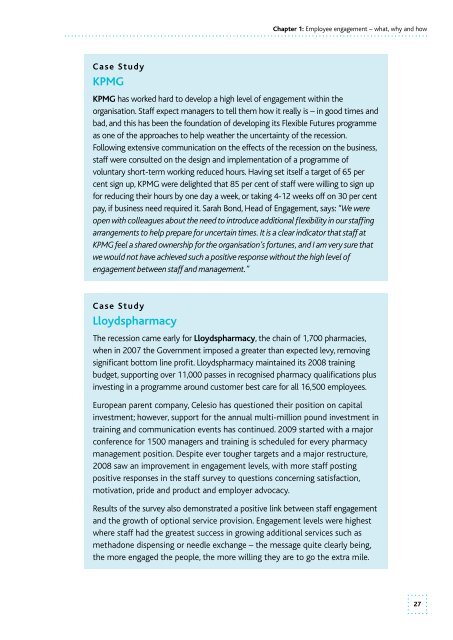3ytgeaf
3ytgeaf
3ytgeaf
Create successful ePaper yourself
Turn your PDF publications into a flip-book with our unique Google optimized e-Paper software.
Chapter 1: Employee engagement – what, why and how<br />
Case Study<br />
KPMG<br />
KPMG has worked hard to develop a high level of engagement within the<br />
organisation. Staff expect managers to tell them how it really is – in good times and<br />
bad, and this has been the foundation of developing its Flexible Futures programme<br />
as one of the approaches to help weather the uncertainty of the recession.<br />
Following extensive communication on the effects of the recession on the business,<br />
staff were consulted on the design and implementation of a programme of<br />
voluntary short-term working reduced hours. Having set itself a target of 65 per<br />
cent sign up, KPMG were delighted that 85 per cent of staff were willing to sign up<br />
for reducing their hours by one day a week, or taking 4-12 weeks off on 30 per cent<br />
pay, if business need required it. Sarah Bond, Head of Engagement, says: “We were<br />
open with colleagues about the need to introduce additional flexibility in our staffing<br />
arrangements to help prepare for uncertain times. It is a clear indicator that staff at<br />
KPMG feel a shared ownership for the organisation’s fortunes, and I am very sure that<br />
we would not have achieved such a positive response without the high level of<br />
engagement between staff and management.”<br />
Case Study<br />
Lloydspharmacy<br />
The recession came early for Lloydspharmacy, the chain of 1,700 pharmacies,<br />
when in 2007 the Government imposed a greater than expected levy, removing<br />
significant bottom line profit. Lloydspharmacy maintained its 2008 training<br />
budget, supporting over 11,000 passes in recognised pharmacy qualifications plus<br />
investing in a programme around customer best care for all 16,500 employees.<br />
European parent company, Celesio has questioned their position on capital<br />
investment; however, support for the annual multi-million pound investment in<br />
training and communication events has continued. 2009 started with a major<br />
conference for 1500 managers and training is scheduled for every pharmacy<br />
management position. Despite ever tougher targets and a major restructure,<br />
2008 saw an improvement in engagement levels, with more staff posting<br />
positive responses in the staff survey to questions concerning satisfaction,<br />
motivation, pride and product and employer advocacy.<br />
Results of the survey also demonstrated a positive link between staff engagement<br />
and the growth of optional service provision. Engagement levels were highest<br />
where staff had the greatest success in growing additional services such as<br />
methadone dispensing or needle exchange – the message quite clearly being,<br />
the more engaged the people, the more willing they are to go the extra mile.<br />
27


